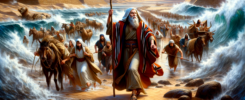How is Jesus Christ considered the Father of our Salvation? What does it mean to say that Jesus is our emissary? What are some key practices or principles emphasized in Mormon Kabbalah for personal spiritual growth and drawing closer to God? Here we will look at these ideas and more.
Jesus Christ: the Father of Our Salvation
In Mormon Kabbalah, Jesus Christ is viewed as the Father of our Salvation. He is not necessarily seen as a father in the same way as Heavenly Father, but as the one who makes salvation possible through His Atonement and resurrection. Being a spiritual path and not a dogmatic religion, what this mean will vary depending on who is speaking. It is generally agreed that Jesus is the Christ, is the spiritual father of those who are born again through Him as the Messiah. This concept aligns with scriptural references that present Christ as the source of eternal life and the one who redeems us from our fallen state. His role as the Father of Salvation signifies His central and indispensable part in God’s plan for humanity’s exaltation.
Jesus Christ: Our Emissary
Viewing Jesus Christ as our emissary emphasizes His role as the divinely appointed messenger and representative of God the Father. As our emissary, Jesus spoke and acted with the full authority of God, revealing God’s will and love to humanity. This understanding underscores the importance of heeding His words and following His example, as doing so is equivalent to receiving God Himself. Furthermore, as our emissary, He bridges the gap between humanity and divinity, making it possible for us to draw closer to God.
The Significance of Teshuvah
In Mormon Kabbalah, Israel is understood not merely as a geographical location or a specific people, but more profoundly as a state of mind and heart. Drawing from Kabbalistic interpretations, the term “YsarmEl” is linked to the Hebrew for “the head, mind, is mine,” suggesting a state of seeking sanctity within one’s own consciousness. Teshuvah, meaning repentance or return, is intrinsically linked to this concept of Israel. It represents the ongoing process of turning away from ego, pride, and selfishness towards altruism and God. This process of teshuvah is crucial in deepening one’s relationship with Jesus Christ, as it aligns our hearts and minds with His teachings and allows us to embrace His grace and live in accordance with His Spirit.
Religious Group and Spiritual Growth
Virtually every church could be labeled a “cult” based on superficial characteristics. However, the critical factor in Mormon Kabbalah for evaluating a religious group or practice is whether it draws individuals closer to Jesus Christ. If an organization or its restrictions foster feelings of inadequacy, pride, or isolation from God, it is considered detrimental. Conversely, if it cultivates love for God and neighbor, humility, and a deeper personal relationship with Jesus Christ, it is seen as a positive influence, regardless of outward labels. Mormon Kabbalah has no church. In this understanding we, as Israel are the Church.
The Church, Zion, and Israel
Mormon Kabbalah emphasizes that the true essence of “the Church” is not defined by a specific denomination or institution, but by the individual’s heart and to whom it is devoted. The question is whether we serve God or Satan, our neighbors or ourselves. The strength of our love for others and our progress in the grace of Christ are the defining characteristics of our church status, rather than our affiliation with any particular religious organization. When we come to God in teshuvah, we are in the straight path to God (Israel). We are building Zion in our hearts, making us the Church.
The Light of Christ
Jesus Christ is essential in Mormon Kabbalah because, despite our efforts, humanity cannot achieve salvation on its own. His Atonement atones for our sins through faith and repentance. The Light of Christ, also termed the Christ Consciousness, is described as divine energy and influence emanating from God through Jesus Christ. This light is given to every individual to discern good from evil, governs all things as the eternal law, and illuminates the path of teshuvah, guiding us towards God and preparing us to receive the Holy Ghost. It is the means by which we can understand and follow the straight path to God.
Key Practices and Principles
Mormon Kabbalah emphasizes several key practices for spiritual growth. These include the ongoing process of teshuvah (repentance and return to God), rejecting ego and embracing altruism, and actively loving and serving one’s neighbor. It also highlights the importance of personal prayer and meditation, not as emptying the mind but as filling oneself with the Holy Spirit to foster a stronger relationship with God. Furthermore, the concept of Tikkun Olam (repairing the world) through living righteously and helping others is central. Recognizing one’s identity as a child of God, focusing on internal spiritual transformation over outward affiliation, and developing faith in God’s plan are also crucial principles in this approach to spirituality.


